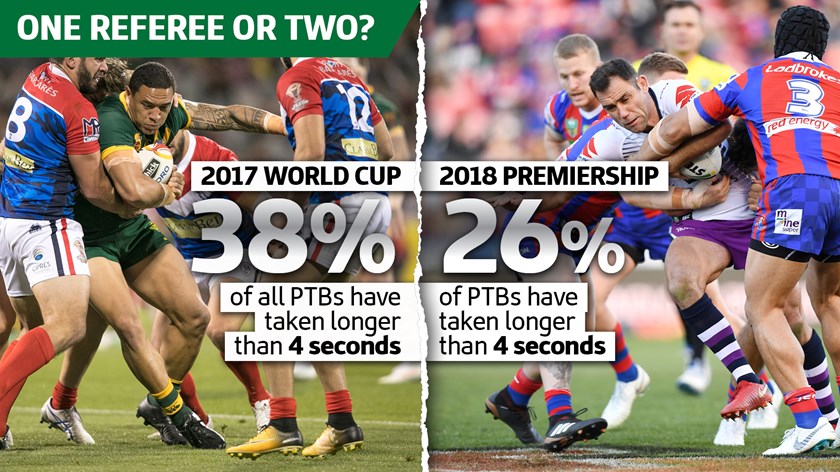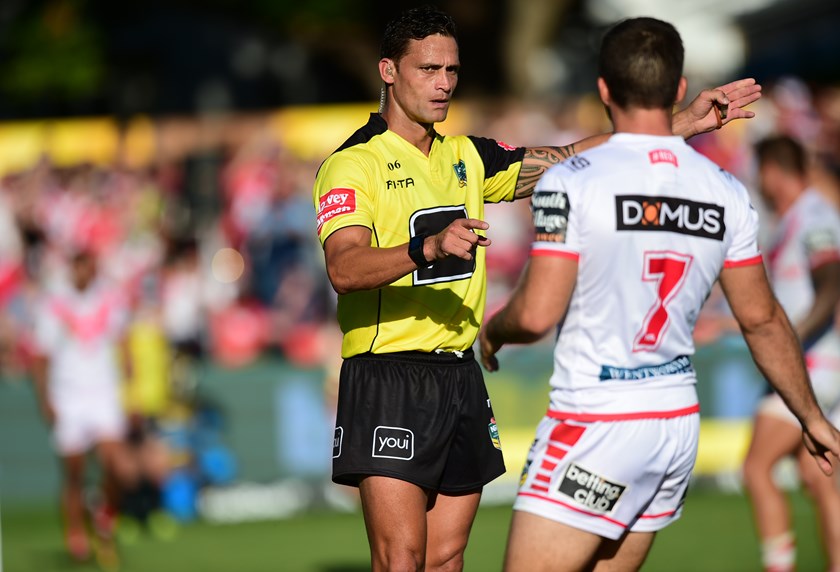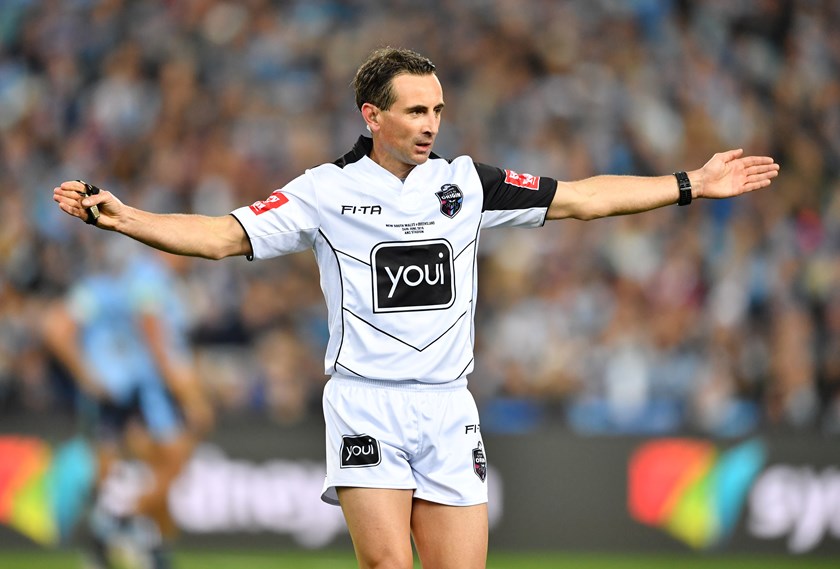Referees' boss Bernard Sutton is adamant the two-referee officiating system is here to stay at NRL level with new data revealing play-the-balls and game speeds are slower when only one whistleblower is used in representative matches.
In a wide-ranging interview with NRL.com, Sutton addressed many issues around the game's referees, from the differences between Origin and club games, to the crackdown on ruck infringements and a new plan to ease penalty counts after CEO Todd Greenberg's call to end their "nitpicking".
One ref v two
Almost every time an international fixture is played under one referee, calls come for the Telstra Premiership to be adjudicated the same way.
The argument on the surface, which has gained support from the likes of Bill Harrigan, can stack up when elite teams like England and Australia produce impressive, free-flowing footy with just one referee in charge.
Figures obtained by NRL.com show that during last year's World Cup 38 per cent of all play-the-balls were classed as "very slow" and took more than four seconds to complete under the one referee system.
Across this year's NRL competition with an assistant referee able to police the ruck, only 26 per cent of play-the-balls have taken more than four seconds.

"What you tend to find is that the play-the-ball speeds without the assistant referee do get slower," Sutton says.
"Across an NRL competition, the two-referee system is very beneficial for us.
"Limiting the amount of penalties around the ruck area comes down to the work rate of the assistant referee, getting the defender out of the play-the-ball area. That's crucial for us.
"We're always looking to refine the way we officiate games and what I've found having refereed myself under the single referee system and also the dual referee system, and now sitting in this position, I'm quite confident that two referees is the right system for the NRL competition."
While the one-referee system can work at an international level, the extra focus on wrestling and winning the ruck at club level is what brought the two-referee system in to begin with in 2009.
Reviews of both systems have found that decisions have been more accurate with two referees, which again is why the pocket referee was introduced in the first place.
"From the World Cup and two-referee system used at NRL level, we’ve found our officials make consistently better, more accurate decisions with two referees on the field," referees' general manager Tony Archer said.
"Their application of the 10-metres is more accurate and their performance is consistently stronger when the assistant referee is there to assist in the decision making particularly in regards to the ruck.
"Decisions at NRL level are critical in such a close competition and the two-referee system is the best way to get those decisions as accurate as possible."
Same ends, different means
With criticism coming from some of rugby league's most influential figures about this year's more stringent policing of the play-the-balls and rising penalty counts, Sutton is bullish when it comes to his whistleblowers' performances.
"Consistent" is the word he uses to describe the officiating across the first 16 rounds.
After Greenberg's concession that "there has been tendency for referees to nitpick" three weeks ago, penalty counts eased in the one round of club matches played afterwards, with an average of 13.9 penalties blown in round 15.
That was the lowest week-on-week figure of the season, down from a peak of 20.9 infringements found per game in round 11.

With three months of the regular season to play, Sutton has directed his referees to call players out more often when they are deemed to be offside, rather than immediately blowing the whistle.
Every club coach has been told this, with Sutton aiming to "enforce the rules and allow for a more expansive game" to prevail.
"I've spoken to coaches on a regular basis and I've been in contact with them more recently since Todd's comments around some of the penalties," he said.
"I took our referees through exactly what that was and put those comments into context. It is a continual battle between the enforcement of the rules and the flow of the game.
"What we are looking at here is increasing our work rate from our assistant referee to get presence at the ruck, to keep the game moving along.
"And also verbal work rate from referees on 10 metres, when a player is identified as offside, being able to nominate the player and try and get a result through communication rather than just penalising them.
"The bottom line there is we're not looking to reduce the standard that we've had. We're just looking at alternate ways of achieving the same standard."
According to NRL.com Stats, the change of tack with offside penalties is already producing fewer infringements.
Up until round 12, an average of 4.6 penalties were given against defending teams for being inside the 10 metres each game.
In the past three weeks of club matches, that figure has dropped to 2.8 a game.
Why the difference between Origin and the NRL?
Origin I in Melbourne was hailed for its rapid pace, with just five penalties awarded across 80 minutes.
Origin II again was a spectacle, though a total of 14 penalties were blown at ANZ Stadium last Sunday night, more in line with a club fixture than the series opener.
Two days after game one, games between Canberra and Penrith (15 penalties) and South Sydney and the Gold Coast (16 penalties) proved stop-start affairs, though the 23 and 30 respective errors in each received less focus than the officiating.
With all eyes returning to the NRL again this weekend, Sutton says the game's showpiece event will be held up as an example of how the game's officials want it played.

"Origin's a really good example of what happens when we get our two best referees and 34 best players in the game on the same field," Sutton said.
"It's also a result of the way the competition's been refereed. Players and coaches walked in there and knew what was expected walking into the Origin arena. That certainly helped when it came to the way the game was refereed.
"I met with both NSW coaching staff and the Queensland coaching staff prior to Origin I and went through exactly what we were expecting.
"I then followed up with both coaches after the game, we talked through the way the game played out, where the referees could've been better, this is what you need to be aware of moving forward.
"The coaches knew what was expected, they communicated that to their players and they came out and wanted to play football. Ultimately that's what we want."


